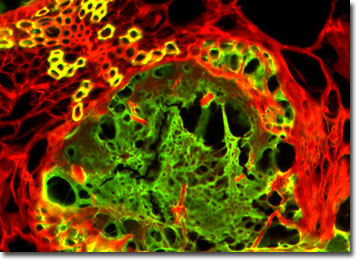Fluorescence Digital Image Gallery
Brown Rot of Peach
Peach brown rot is a serious disease of fruit trees caused by the fungus Monilinia fructicola. Also affected by this devastating fungus are other stone fruits such as cherries, plums, prunes, nectarines, and apricots.

The fungus forms cankers on the twigs of the fruit trees, but it does the most damage when it rots blossoms and fruit. At harvest, apparently healthy fruit may be contaminated with spores and decay during storage and marketing.
Monilinia fructicola has two spore types. The ascospores, which are produced sexually, are stored over the winter in mummified (rotted and dried) fruits and in twig and branch cankers. They are released in the spring and carried by the wind to unopened blossoms and young shoots. If conditions are warm and wet, the spores will germinate. The summer spores, conidia, are produced vegetatively (self-cloning) and are carried by the wind and insects to other parts of the tree where they can infect the maturing fruit.
The specimen presented here was imaged with a Nikon E600 microscope operating with fluorite and/or apochromatic objectives and vertical illuminator equipped with a mercury arc lamp. Specimens were illuminated through Nikon dichromatic filter blocks containing interference filters and a dichroic mirror and imaged with standard epi-fluorescence techniques. Specific filters for the infected peach stained thin section were a B-2E/C and a Y-2E/C. Photomicrographs were captured with a Optronics MagnaFire digital camera system coupled to the microscope with a lens-free C-mount adapter.
BACK TO THE FLUORESCENCE DIGITAL IMAGE GALLERY
